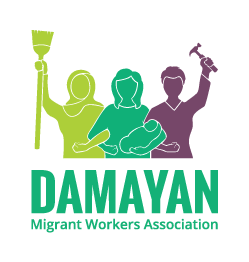Happy Father's Day!
Happy (belated) Father’s Day! While Father's Day took place last Sunday, June 20 we want to take the time to commemorate the fathers in the Filipino migrant worker community.
We honor the fathers who have given themselves wholeheartedly to their families and who have given their all to provide a better future. Fathers who have made the sacrifice of working overseas, enduring forced family separation, and being away from their children milestone after milestone. Fathers who have stayed behind to care for their children, while their spouse worked overseas. Fathers who are labor trafficking survivors, suffering through abuse and rising another day, all to provide a better tomorrow for their families. We also recognize and honor the mothers who have stood as both father and mother to their children, raising them single-handedly even through insurmountable challenges. This day is for you all.
Filipino fathers are forced to migrate for jobs rampant with labor trafficking
While Damayan recognizes the resilience of these family men, we raise awareness on the problem of forced family separation, its costs, and the root causes that continuously allow it to flourish and wreak havoc in countless Filipino families.
Due to the lack of jobs available in the Philippines and the global demand for “cheap” foreign labor, 2.2 million women and men were forced to leave their families and find work overseas in 2020 (Philippine Statistics Authority). That left millions of Filipino children without a mother or a father. Approximately 968,000 of those forced to leave were men (Philippine Statistics Authority), separating fathers from their children. Alfred, a Damayan member, was forced to leave his 3-year-old son in the Philippines in 1985 to work in Riyadh, Saudi Arabia. When Alfred successfully secured a job as a driver for an ambassador in the US, he was subjected to exploitation. Alfred is one of the many Filipino fathers who, on top of being separated from his family, is trafficked for his labor.
The labor trafficking of fathers is perpetuated by the systemic exportation of labor in the Philippines that leads them to jobs with precarious working conditions without legal protections. This exploitation is rampant in the domestic, hotel, restaurant and personal transportation industry in the US. Damayan members’ experiences, like Alfred’s, attest to this.
End forced migration
Forced migration not only separates families for decades, it also breaks the bonds between family members. Dysfunctional relationships, resentment and conflict are common for families with an overseas parent. These dynamics are passed on to the next generation in families whose children eventually are forced down their parent’s path to go overseas. It is unacceptable that broken families have become an accepted byproduct of economic survival. If we do nothing about it, this toxic cycle will continue for future generations.
Forced economic migration is by no means necessary. It is an intentional byproduct of foreign influence that eventually controls the Philippine economy. The Philippine government benefits greatly from billions of remittances that Filipino migrant workers send back home, yet do not think twice about the cost to the families broken and torn apart. Wealthy countries, such as the US, demand “cheap, disposable, and exploitable” labor, yet have no awareness of its consequences to fathers, mothers, and children.
The rebuilding of the Philippine economy is an urgent priority of the Philippine government, and as we seek sovereignty and protection for our Filipino families. We call for an end to the demand for cheap, disposable, and exploitable labor that renders migrant workers vulnerable to labor trafficking. We call for an end to the blatant disregard of the family unit over economic demands so that no father, or mother, will ever have to choose between feeding their children and being there to raise them. In this statement, we seek to honor fathers by exposing the root cause of forced migration of Filipinos.
Let us end this traumatic cycle for all the future generations. The Philippine economy should serve the interests of Filipino families. We must rid the Philippines of US influence and revamp the national economy to survive on its own.
Sources:
Republic of the Philippines Department of Foreign Affairs https://dfa.gov.ph/distribution-of-filipinos-overseas
Pew Research Center https://www.pewresearch.org/social-trends/2012/06/19/chapter-4-immigration-and-transnational-ties/
Philippine Statistics Authority https://psa.gov.ph/statistics/survey/labor-and-employment/survey-overseas-filipinos
Phillippine Statistics Authority, 2018 Survey on Overseas Filipinos Table 1.3A TABLE 1.3A Distribution of Overseas Filipino Workers by Place of Work, Sex and Area 2018.xls

